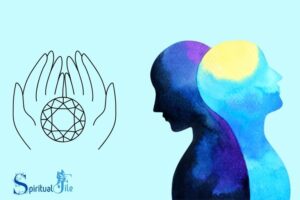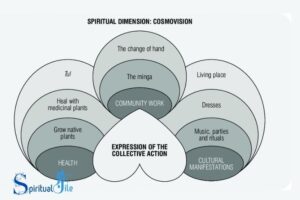Spiritual Self William James Example: Values!
The spiritual self is a concept derived from the philosophy of William James, referring to an individual’s inner, spiritual life, which encompasses their religious beliefs, values, and connections with the universe or a higher power.
According to William James, an influential American philosopher, and psychologist, the spiritual self is the third aspect of the self, following the material and social selves.
This dimension of selfhood also includes a person’s perception of their connection with the universe or a sense of a higher power.

Key Takeaway
6 Aspects: Spiritual Self William James Examples
| Aspect | Description | Example |
|---|---|---|
| Self as Subject | According to William James, the spiritual self is seen as the self as ‘subject’. This refers to personal subjectivity and introspection. | A person might feel more spiritual when they reflect on their place in the universe. |
| Self as Object | The spiritual self can also be seen as the self as ‘object’. This refers to how a person perceives and identifies their spiritual aspect. | A person might identify themselves as a spiritual being having a human experience. |
| Spiritual Beliefs | James believed that spiritual beliefs form a significant part of a person’s spiritual self. | A person may believe in a higher power, afterlife, etc. |
| Religious Identity | One’s religious identity is also a part of their spiritual self. | A person might identify themselves as a Christian, Buddhist, Muslim, etc. |
| Transcendental Experiences | James believed that transcendental experiences have a crucial influence on a person’s spiritual self. | A person might have experiences that transcend the ordinary such as mystical experiences or near-death experiences. |
| Personal Transformation | The spiritual self is also about personal transformation and growth. | This might involve a person evolving their beliefs or becoming more compassionate and kind. |
The Conceptual Framework Of Spiritual Self
The spiritual self, exemplified by william james, is a framework that explores the deeper connection between individuals and their spiritual beliefs.
It delves into concepts such as the pursuit of higher meaning, personal growth, and the understanding of one’s purpose in the universe.
Spirituality is a deeply personal and introspective aspect of human existence that encompasses beliefs, values, and experiences beyond the material realm.
Definition And Significance Of Spiritual Self:
- The spiritual self refers to the part of an individual that seeks to understand and connect with the divine or higher power.
- It involves introspection, reflection, and the cultivation of inner peace, harmony, and alignment with one’s core values.
- The significance of the spiritual self lies in its potential to provide meaning, purpose, and direction in life, as well as promote personal growth, well-being, and a sense of belongingness to something greater than oneself.
Overview Of William James’ Perspective On Spiritual Self:
- William james, an american philosopher and psychologist, offered profound insights into the spiritual self and its significance in human experience.
- He emphasized the personal and subjective nature of spirituality, viewing it as an essential part of human identity and well-being.
- James posited that spiritual experiences are not exclusive to religious individuals but can be found across various cultures and belief systems.
- According to james, spiritual self-discovery can lead to a profound transformation of an individual’s worldview and perception of reality.
- He recognized that spiritual experiences can bring about a sense of awe, wonder, and interconnectedness, as well as provide solace, guidance, and a deeper understanding of life’s mysteries.
By exploring the conceptual framework of spiritual self, we can tap into the depths of our being, discover our core values and beliefs, and embark on a transformative journey towards greater meaning, purpose, and inner harmony.
It is through this exploration that we can cultivate a deeper understanding of ourselves and our place in the world, fostering personal growth, well-being, and a sense of connection to something greater than ourselves.
Key Elements Of Spiritual Self
The key elements of spiritual self, as exemplified by william james, encompass personal reflection, inner growth, and connection to a higher power.
Through self-discovery and spiritual practices, individuals can nurture their spiritual selves and experience a deeper sense of purpose and fulfillment.
Inner Consciousness And Self-Reflection:
Self-reflection is a fundamental aspect of developing our spiritual selves. It involves turning our attention inward and observing our thoughts, emotions, and experiences.
Inner consciousness refers to the awareness of our innermost being, the core essence that exists beyond our physical bodies. It is the part of us that connects to something greater, something beyond the material world.
Key elements of developing our spiritual self through inner consciousness and self-reflection are:
- Mindfulness practice: Engaging in mindful activities such as meditation or yoga helps to quiet the mind, increase self-awareness, and create a deeper connection with our inner selves.
- Journaling: Writing in a journal allows us to explore our thoughts, feelings, and experiences, providing valuable insights into our spiritual journey. It helps us identify patterns, track our progress, and gain clarity.
- Seeking solitude: Taking regular moments of solitude allows for self-reflection, introspection, and the cultivation of inner peace. It creates a space for connecting with our spiritual selves and listening to our inner wisdom.
- Questioning beliefs: Questioning our beliefs, both inherited and self-formed, helps us uncover any limiting or restrictive ideas. By challenging these beliefs, we open ourselves up to new perspectives and possibilities, fostering spiritual growth.
- Embracing vulnerability: Being willing to be vulnerable and face our fears allows us to transcend our ego and connect with our spiritual essence. It involves acknowledging our imperfections, practicing self-compassion, and cultivating authenticity.
Remember, developing our spiritual selves is a unique and personal journey. These key elements provide a foundation for growth and exploration but should be adapted and modified as per individual preferences and beliefs.
The ultimate goal is to cultivate a deep sense of connection, inner peace, and alignment with our spiritual essence.
Overcoming Challenges In Developing Spiritual Self
Developing our spiritual self can be a challenging journey. Looking to the example of william james, we find inspiration in navigating these hurdles and finding inner peace.Developing one’s spiritual self can be a transformative journey.
However, it is not without its challenges. In this section, we will explore two key challenges that individuals often face in their quest to develop their spiritual self: dealing with doubt and skepticism, and managing setbacks and obstacles.
Dealing With Doubt And Skepticism
It is not uncommon for individuals embarking on a spiritual journey to experience doubt and skepticism along the way. These doubts may arise from various sources such as societal pressures, conflicting belief systems, or personal experiences.
Here are some strategies to help overcome doubt and skepticism:
- Stay open-minded: Embrace a mindset of curiosity and openness. Allow yourself to explore various perspectives and beliefs, even if they challenge your current understanding.
- Seek knowledge and understanding: Educate yourself about different spiritual practices and philosophies. Engage in deep learning and research to gain a deeper understanding of the concepts you are exploring.
- Connect with like-minded individuals: Surround yourself with supportive peers who share your spiritual interests. Engaging in discussions and sharing experiences can help validate your beliefs and provide a sense of community.
- Practice self-reflection and introspection: Set aside time for self-reflection to examine your doubts and thoughts. Meditation, journaling, and mindfulness practices can assist in developing a deeper connection with your spiritual self.
Remember, overcoming challenges in developing your spiritual self is a continuous process. Embrace the journey with patience, perseverance, and a willingness to grow.
Conclusion
The example of william james’s spiritual self has provided us valuable insights into the depths of human consciousness and the quest for meaning in life.
By exploring james’s personal experiences and reflections, we have discovered the potential of spirituality in nurturing inner peace, emotional well-being, and personal growth.
James’s emphasis on the individual’s subjective experience and the importance of embracing multiple perspectives has paved the way for a more inclusive and holistic approach to spirituality.
Through the lens of james’s spiritual self, we have witnessed the power of introspection, mindfulness, and the cultivation of a deeper connection with oneself and the world around us.
It is evident that spiritual practices, regardless of religious affiliations, are essential tools for transcending the mundane and attaining a heightened sense of purpose and fulfillment.
may we continuously seek and strive for deeper understanding, connection, and enlightenment on this extraordinary journey of life.






